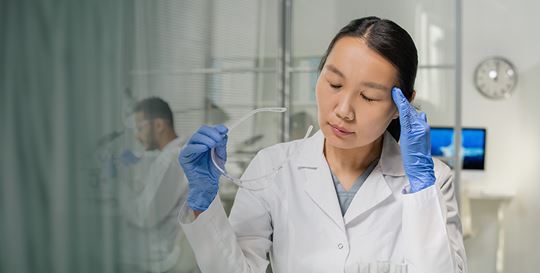The COVID-19 pandemic is a strain on all parts of healthcare, but the pressure on microbiology laboratories is often unseen.
The New York Times recently reported on some of the impact. Labs that did no COVID-19 testing in 2019 have performed hundreds of thousands of tests in 2020, and what’s coming in 2021 is offering no relief.
The Times article recounts how Dr. April Abbott, the microbiology lab director of Deaconess Hospital in Evansville, Indiana, dragged a hospital bed into her office so she could catch some sleep when working overnight to relieve her over-burdened lab. In her clinical microbiology laboratory, a team of 40 scientists work around the clock running coronavirus tests.
Dr. Abbott and countless other healthcare laboratory heroes are the faces behind the 193 million coronavirus tests - and counting, that have been performed in the U.S. since the start of the pandemic.
Overwhelming Healthcare Challenges
Experienced microbiologists report feeling stressed, overwhelmed, and physically and mentally fatigued. On top of their daily workload, technologists are also having to take care of repetitive stress injuries from doing manual tasks such as maneuvering tubes and pipetting.
The pandemic is exacerbating an existing problem; experienced microbiology lab staff were already a dwindling resource.
Those who can retire are doing so, adding to lab staffing shortage woes that the laboratory workforce is already facing.
To make matters worse, microbiology laboratories are on the frontline of two healthcare challenges: the COVID-19 pandemic and increasing rates of antibiotic resistant infections.
The occurrence of untreatable infections is an unfortunate reality. Without comprehensive and timely microbiology tests like culture, ID and AST results, patients are at risk of not getting the right antibiotic and succumbing to an infection that would have been otherwise treatable.
Smart Microbiology Automation is the Solution
Lab directors need options and sleeping in the office is not the answer.
Automation may be a possible solution and can ease the crush of laboratory work in the microbiology lab.
Approximately 30% of FTE time is spent inoculating plates and broth – tasks that can replaced by automation.
Examples of automation solutions for the microbiology lab are Copan's WASP® DT: Walk-Away Specimen Processor and WASPLab Digital Microbiology System.
Hope in Sight
A review of three North America healthcare systems which implemented WASP automation demonstrated that staff efficiencies were gained in all facilities regardless of size and test volume.
This means that laboratories can maintain quality testing and test volume while experienced staff can focus their time on the most critical issues.
There is hope in sight for the pandemic to come to an end, but the challenges of diagnosing infectious diseases is unending.
Laboratory automation may be the key to streamlining workflow when time is critical.
Find out how you can use smart microbiology automation to get reliable results, save time and reduce overhead through full automation of preanalytical, analytical and postanalytical tasks.
Learn more about our microbiology automation solutions ›

 English
English





